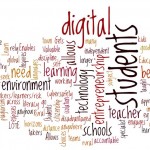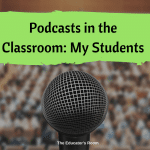 My husband is separated from me and my daughter by 2,000 miles during my sabbatical here in Santa Fe, New Mexico. We are determined to continue our traditional family time despite the distances. How we engage in meaningful dialogues leads to less loneliness and motivation to appreciate all that we can from life in a new environment. Our experiment with distance learning began with our Ipad. Face time allowed us to bring “Flat Daddy” to the dinner table and eat as a family. Together, we watched the sunset and the quail scurry in the backyard. Together we could brush our teeth. Flat Daddy enabled us to continue the nightly story time routine while I used a few moments for other chores. Our daughter did protest the routine reliance on Face time when she realized that hugging the Ipad gave her little comfort. As two veteran teachers in public schools, my husband and I recognize the same concerns with balancing technology and education in hybrid or blended learning (courses taught both online and in a mandatory classroom). The advantages of communication with our Ipad were too important to give up on but it would be necessary to readily adapt to the rapidly changing learning environment we had created.
My husband is separated from me and my daughter by 2,000 miles during my sabbatical here in Santa Fe, New Mexico. We are determined to continue our traditional family time despite the distances. How we engage in meaningful dialogues leads to less loneliness and motivation to appreciate all that we can from life in a new environment. Our experiment with distance learning began with our Ipad. Face time allowed us to bring “Flat Daddy” to the dinner table and eat as a family. Together, we watched the sunset and the quail scurry in the backyard. Together we could brush our teeth. Flat Daddy enabled us to continue the nightly story time routine while I used a few moments for other chores. Our daughter did protest the routine reliance on Face time when she realized that hugging the Ipad gave her little comfort. As two veteran teachers in public schools, my husband and I recognize the same concerns with balancing technology and education in hybrid or blended learning (courses taught both online and in a mandatory classroom). The advantages of communication with our Ipad were too important to give up on but it would be necessary to readily adapt to the rapidly changing learning environment we had created.
Adaptation and routine is a difficult balance for teachers and students. Flat Daddy did fly out for visit and this reestablished our relationship as willing members of our blended classroom. Meeting together and listening to our daughter’s evaluation was crucial to adapting the proper resources for improving this study. We discovered that it was impossible for her to follow a chapter book read to her online as she became easily distracted by her own environment. We also learned that our daughter objected to Facetime meetings at the same time each night for a forced family discussion. We clarified our purpose and decided that readings would be shorter with a focus on problem solving. Short mysteries series (American Girl, Magic Tree House, A to Z Mysteries) provided us with “I wonder” and “do you suppose” predictions that kept the chapters fresh in her mind and led to better Facetime discussions at the virtual dinner table. Online discussion was shortened and daughter gained the responsibility of picking the next meeting time, often set for only a 1/2 hour later.
Gaming is an incentive for improved dialogue. With the Ipad in front of her and my IPhone in her hand, our daughter used the Draw Something app to send a picture of a word to Flat Daddy . Watching him receive the drawing, led to much laughter, afforded hints and great enthusiasm when the image was deciphered. Flat Daddy sent one back and this game continued for at least an hour one morning. The same affect happened with Will Short’s Sunday Puzzle. We all listen to the puzzle podcast, shout out guesses, replay the podcast, and discuss puzzle solutions. Another app with momentary appeal is Draw a Stickman. Gaming creates interactions that are engaging, unintentional yet purposeful.
So what has this experiment taught me about education? E Literacy is an integral part of the blended classroom when there is room for negotiation, adaptation and construction. Routine person to person interactions are necessary. However if long periods of time pass between feedback between individuals, people become disengaged. Technology is supposed to spawn change which means that adults & children are part of that collective intelligence, sharing incentives and strategies for best practice. Teachers can provide purpose and framework but can trust student’s articulated opinions for how learning is received. While educators lose some control, students gain valuable responsibilities. Our Flat Daddy construct worked because we allowed for instant response to our daughter’s perspective and we narrowed our focus on readings that fostered habits of critical thinking, nothing else.
In the real classroom, I admit that not all E Literacy can activate higher orders of thinking. While active, intuitive and visual learning styles benefit the most from online collaborations, learning styles adjust and new preferences can be stimulated when change or self reliance is expected. This means that assessment must be based on the exploration of multiple pathways and student eagerness to utilize tools for learning. Gaming can be the tool for exploration and indirect learning opportunities. If nothing else our Flat Daddy dialogues became richer when our daughter had a the gaming text connections to talk about. Purposeful discussion has helped bridge the physical distances between our family members and bridge the distance between home and school. Education that fosters experimentation and practice is a construct that can go wherever you may go.
References:
Gunawardena, C. N., Hermans, M., Sanchez, D., Richmond, C., Bohley, M., & Tuttle, R. (2009). A theoretical framework for building online communities of practice with social networking tools. Educational Media International, 46(1), 3-16. Retrieved from Education Research Complete.
Guthrie, K. L., & McCracken, H. (2010). ReflectivePedagogy: Making Meaning in Experiential Based Online Courses. Journal ofEducators Online, 7(2), 1-21. Retrieved from EBSCOhost.
Savery, J. R., BE VOCAL: Characteristics of successfulonline instructors. (2010).Journal of Interactive Online Learning, 9(3), 141-152. Retrieved from Education ResearchComplete.






Great write up—makes me feel not quite so flat……. Sincerely, flat Daddy.